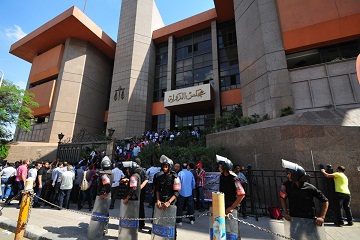
Judges across Egypt have gone on strike to protest against President Mohammed Morsy’s constitutional declaration, and in line with the decisions made yesterday in an emergency meeting of the Judges’ Club.
No precise statistic has emerged detailing how many judges are on strike, but Mohamed Shedana, a lawyer at the Arab Program for Human Rights Activists, said that 70 per cent is the number being most widely agreed upon by their contacts in the judiciary, the Judges’ Club general assembly, and other human rights NGOs.
Not all judges protested though, with a group calling itself the Judges for Egypt continuing to hear cases. This leaves the country with around 30 per cent of judges still practising, who are the most sympathetic with the Muslim Brotherhood and the actions the president is taking.
Sunday’s actions underscore the rift in the judiciary that revealed itself on Saturday, after an emergency meeting in which the Judges’ Club said it rejected the president’s declaration, claiming it interfered in the independence of the judiciary and sought to influence the political landscape in an unlawful manner.
Also on Saturday, the Judges for Egypt made statements, which ran on both the Muslim Brotherhood and Freedom and Justice Party websites, that called for judges to support the president’s declaration. The group’s spokesperson, Walid Sharabi, was quoted as saying, “Morsy is the president of revolutionary Egypt. Thus, his decisions, resolutions and decrees favour the revolution.”
Mohamed Abdel Aziz, a lawyer at the Al-Nadeem Center, said of the Judges for Egypt, “they are not judges for Egypt, they are judges for the Brotherhood. They are against justice. Those judges do not coordinate with the Supreme Judiciary Council. They are more of a party coalition.”
Abdel Aziz said that the Judges’ Club in many ways is considered to be the judges’ syndicate, so members should comply with the decisions made by its general assembly. Especially, explained Abdel Aziz, because this is not a decision against a person, but rather the way Morsy is changing the way the executive and judicial branches interact with each other in Egypt.
“Going against a decision that comes from the Judges’ Club could be disciplined,” added Abdel Aziz.
“The judges split into two wings,” Ahmed Yousry, a lawyer at the Hisham Mubarak Law Centre, “those who supported the Constitutional Declaration and those who are against it. Those who are against it stopped working, the others are going to do their work as usual.”

